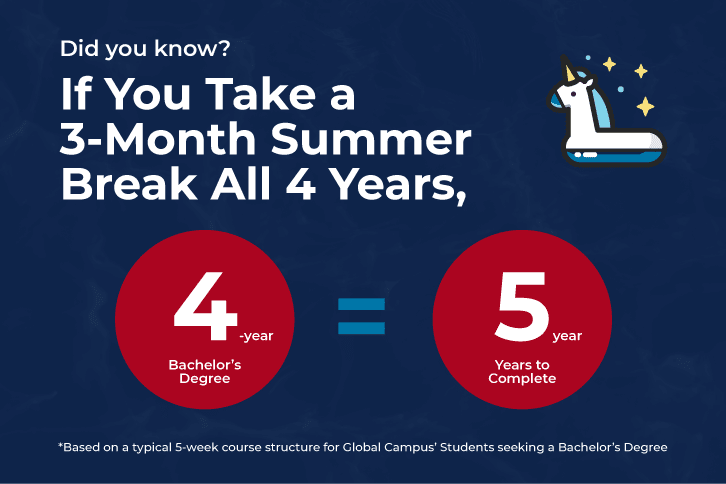View the Infographic »
Traditional schools, including most brick and mortar universities, typically operate on a nine-month academic schedule that was created before the industrial era, back when farming was many people’s main source of income. This allowed students plenty of time to help out on the family farm when the planting season demanded all-hands on deck.
Luckily, for all the non-agrarian students today, online institutions such as the University of Arizona Global Campus (UAGC) acknowledge that modern work schedules aren’t necessarily dictated by the seasons or the best time to harvest crops.
Instead, the classes are structured to provide flexibility, allowing students to take one class at a time while still taking care of other responsibilities, such as work or family obligations. As such, there’s no real need for every student to take a three-month-long summer break from their college studies.
However, mentally and emotionally, many people still associate summer with the idea of taking some time off or they worry classes will throw a crimp in the action-packed summer social plans.
Of course, summer can also be a time to focus on yourself and catch up on your personal goals. Frequently, this includes educational or career pursuits.
If you are wondering whether it’s worth it to continue school in the summer, we’ve outlined the top benefits to going to summer school, as well as the pros and cons that will help you decide if taking college courses in the summer is right for you.
The Benefits of Going to College in the Summer
There are many benefits of summer school with the way courses at UAGC are structured. You can complete your degree by your intended graduation date and pace out your classes, so you don’t have to push out your graduation date.
Take a look at some of the key reasons to consider starting school or continuing with your online college classes throughout the summer.
Benefit 1: Speed to Degree
At UAGC, the school year is set up on a rolling basis rather than in semesters, with courses running continuously throughout the year. This flexible schedule allows adult students to earn their degree while also focusing on other responsibilities, such as a job and family. Typically, as an online student, you will take one five- or six-week course (or up to nine weeks for doctoral candidates) at a time, with the only gap between studies being the two weeks off during winter break.
If you start your journey at UAGC with no previous college credits or credit transfers, you will need to earn 120 credits to graduate with a bachelor’s degree. By design, completing those classes without a break means you will graduate with your degree in the usual four years.
For students enrolled in a master or doctoral program, the course and credit requirements can differ somewhat, so your timeframe to graduation may vary depending on your major.
Most students find this consistently paced schedule works well for them. However, if you’re itching to speed things up, UAGC does offer ways for qualified students to get their degree more quickly.
Ways to obtain your degree more quickly can include earning non-traditional college credits for work or life experience, such as through the Experiential Learning Credit (ELC) Workshop or knocking out courses at a reduced cost through our partnership with Sophia Learning. Take a look at this article for a more complete rundown of six ways you can get college credit for knowledge and experience you already may have.
Likewise, if you’re an eligible senior-level bachelor student who plans on continuing to get your master’s degree, you may want to check out the UAGC SMART Track. This program allows you to earn up to nine applicable grad credits toward your master’s degree. You’ll not only be able to shave up to 18 weeks off the time it would take to complete your graduate degree, but also save money by taking grad-level classes for the cost of undergraduate ones.
Benefit 2: Enhanced Skills
Although any time of year is a great time to develop your skills and prepare for new career opportunities on the horizon, summer can be particularly useful if you’re in a field that generally takes a summer break, such as education.
In addition to the usual added free time that comes from not having to go to work, this summer, may be a beneficial time to take some extra classes.
This can translate into enrolling to get a master’s or doctorate or simply taking a relevant course or two as a non-degree seeking student. Either way, you’ll find it easier to set yourself apart and possibly get an edge in your career by deepening your knowledge in your field.
Benefit 3: Career Trajectory
With the enhanced skill set you can build while going to school in the summer, you will be closer to earning your degree and could have more highly desirable skills.
Job recruiting traditionally slows down during the summer months, which can make it an extra beneficial time to take classes.
Benefit 4: Stay Sharp Mentally
Ever heard of “summer slide”? Some people call it “brain drain” or “summer learning loss” and it refers to the way students tend to forget some of what they learned when school isn’t in session for an extended period of time.
Although it’s been studied more extensively amongst students K-12, research indicates that while grade-schoolers may lose two or more months of reading and math skills during the summer, that loss is magnified even more at higher grade levels.
For adult learners, staying in school throughout the year isn’t the only way to beat the summer slide, but you may find it helps to stay in the habit of studying. It’s said to take approximately 66 days to break a habit, which means taking a full three-month break (90+ days) might make it extra difficult for you to get back into school mode.
If you do end up taking time off in the summer, know that your first class back may feel a little more demanding.
However, with practice, you will get better as a student.

Should You Take Time Off from School in the Summer?
There’s no doubt that continuing classes without a break will get you to the finish line faster.
Despite the benefits of going to school in the summer — whether you already are a UAGC student or considering starting college in the summer — the idea of taking some time off (or waiting to start school in the fall) still might be tempting.
If you feel like you need some time to recalibrate in the summer, you wouldn’t be alone. 76% of people who complete their bachelor’s degree take at least one extended break from college.
Much like anything else, taking time off has its own sets of pros and cons.
For UAGC students earning a bachelor’s degree via the typical 5-week course structure, bear in mind that taking a full three months off during your freshman, sophomore, junior, and senior years will set back your expected graduation date by an entire year.
Note: Taking a break longer than 14 days may mean you are dropped from your program due to attendance requirements, so it’s crucial to contact your academic advisor if you’re considering a break of 14-45 days in order to get the appropriate approvals on file to remain in your program.
One thing to stress is that for students who are considering a break is to make sure they do their research first and understand the pros and cons before they make their decision.
Is Summer School Right for You?
If you’re wondering if going to school in the summer is worth it because you feel that you’ve been floundering or that life circumstances have affected your academic performance, it’s crucial to reach out for support. UAGC offers a wide array of services to help students succeed. You never know which one could most benefit your situation until you reach out.
Here are some critical resources to help you succeed as an online college student at UAGC:
1. Advisor Support Team – Includes your student advisor and financial aid advice. This is where you should turn to first if you’re considering taking a break between your classes.
2. Office of Student Access and Wellness – Fosters equal opportunities to student success, advocacy, and support for students with disabilities and chronic health conditions.
3. Your Academic Support Team – This includes your instructors, the University of Arizona Global Campus Library (open 24/7!), and paper and assignment support through the University of Arizona Global Campus Writing Center.
4. New Student Resource Guide – If you’re a new student at the University of Arizona Global Campus, begin here to make sure you have everything you need for a successful start in your journey.
5. CHAMPS Peer Mentoring – Connect with a high-achieving student or alumni who can help you develop as a student and encourage you to do your best.
6. Career Services Support Team – Whether you’re still a student or a graduate ready to move up the corporate ladder, you’ll find the guidance and resources you need on your job search.
7. Student Advocate HELPline – If you are dealing with suicidal thoughts, domestic violence, homelessness, or other hardships, please email HELP@uagc.edu to connect with a Student Advocate ASAP or call 911 if you feel your life is in immediate danger.
If you are still wondering if going to school in the summer is worth it, reach out to an advisor today and find out how Global Campus can help you reach your goals.
--
Written by University Staff


